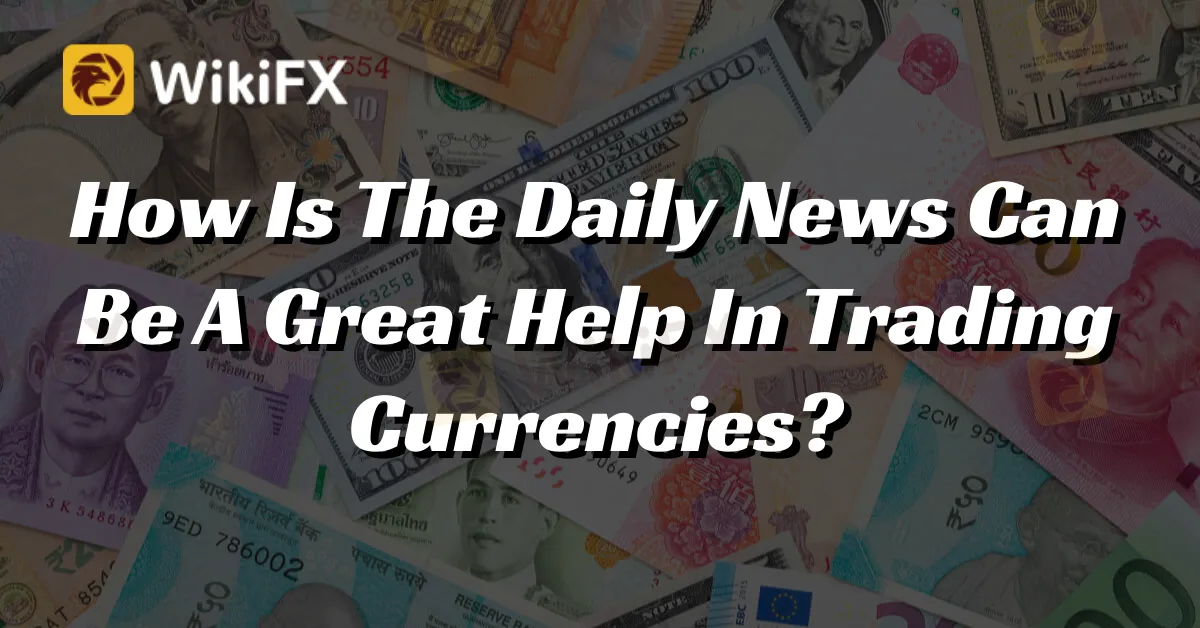简体中文
繁體中文
English
Pусский
日本語
ภาษาไทย
Tiếng Việt
Bahasa Indonesia
Español
हिन्दी
Filippiiniläinen
Français
Deutsch
Português
Türkçe
한국어
العربية
How Is The Daily News Can Be A Great Help In Trading Currencies?
Abstract:News and current events often have an influence on financial markets and may provide traders with information. For example, if a news report regarding a firm's results is better or worse than predicted, the stock price of that company may be affected. Similarly, if there is a news article on a country's economic performance or political changes, the value of that country's currency may be affected.

News and current events often have an influence on financial markets and may provide traders with information. For example, if a news report regarding a firm's results is better or worse than predicted, the stock price of that company may be affected. Similarly, if there is a news article on a country's economic performance or political changes, the value of that country's currency may be affected.
When making trading choices, traders may utilize news and current events as part of their research. It is crucial to recognize, however, that news and current events may be unexpected and may not necessarily have an obvious or enduring influence on financial markets. As a result, traders must use a range of tools and methodologies in their research rather than relying just on news and current events.
What are the variables that might cause specific currency pairings to fall?
Many variables may influence the value of a currency pair. Among the most prevalent factors are:
Economic indicators: A country's economic success may have a substantial influence on the value of its currency. For example, if a country's GDP expands, its currency may appreciate; conversely, if the economy slows or enters a slump, the currency may decrease.
Interest rates: Higher interest rates tend to attract foreign investment and strengthen currencies, whilst lower interest rates may discourage investment and weaken currencies.
Inflation: High levels of inflation may undermine a currency's buying power and cause it to lose value.
Political instability: May lead to a loss of investor confidence in a country's currency, causing its value to fall.
Natural disasters: Catastrophes, such as earthquakes or hurricanes, may impair a country's economic activities and even cause its currency to lose value.
Intervention by central banks: Central banks may sometimes purchase or sell substantial quantities of a currency in order to affect its value.
Speculation: Market speculation may also have an impact on the value of a currency. If investors anticipate that a currency will appreciate in the future, they may purchase it, causing its value to rise. If, on the other hand, investors feel that a currency will decline, they may sell it, lowering its value.
Conclusion
Traders must examine the possible risks and benefits of daily trading, as well as the need for a well-defined trading strategy and risk management plan. While news and current events might offer traders important information, it is ultimately the trader's obligation to make educated and well-reasoned trading choices based on a range of criteria.
Follow for more Forex Educational news.
Download and install the WikiFX App on your mobile phones from the download link below to stay updated on the latest news, even on the go.
Download link: https://www.wikifx.com/en/download.html

Disclaimer:
The views in this article only represent the author's personal views, and do not constitute investment advice on this platform. This platform does not guarantee the accuracy, completeness and timeliness of the information in the article, and will not be liable for any loss caused by the use of or reliance on the information in the article.
Read more

Oleg Mukhanov Steps Down as TradingView CEO Amid Leadership Shakeup
In a surprising announcement on Thursday, Oleg Mukhanov, who has been at the forefront of TradingView’s growth over the past few years, revealed his decision to step down as CEO. Mukhanov, who ascended to the role in January 2024 after joining the technology giant in mid-2022 as Group Chief Financial Officer, will continue to serve as an advisor to TradingView’s board.

Deutsche Bank Facing Record Fine from German Watchdog – What’s the Price
Germany's watchdog imposed a EUR 23.05 million penalty to Deutsche Bank AG for violating several regulatory requirements under German law. According to the Authority, the company breached organisational requirements under the German Securities Trading Act in connection with the sale of derivatives. In addition, its Postbank branch disregarded the obligation to record investment advice and repeatedly failed to comply with the requirements of the German Payment Accounts Act regarding the account switching service.

The Hidden Tactics Brokers Use to Block Your Withdrawals
In the fast-paced world of online trading, liquidity is everything. Traders and investors must have unrestricted access to their funds at all times. Any broker that imposes unnecessary conditions or delays when it comes to withdrawals is raising a glaring red flag.

Forex Trading: Scam or Real Opportunity?
Meta: Explore forex trading: Is it a scam or real opportunity? Learn how it works, debunk myths, manage risks, and avoid scams with tools like WikiFX App. Start trading safely today!
WikiFX Broker
Latest News
Is $CORONA Memecoin a Legit Crypto Investment?
Is Pi Network the Next Big Crypto Opportunity?
Is Linkbex a Scam? SFC Warns of Virtual Asset Fraud in Hong Kong
Donald Trump’s Pro-Crypto Push Boosts PH Markets
5 Best Copy Trading Brokers: You Can Trust in 2025
3 EXCLUSIVE Ramadan Offers That Won’t Last Long! ACT NOW
The Next Crypto Giants: 5 Altcoins to Watch
Japan’s Shift in Crypto Policy and What It Means for Investors
Forex Trading: Scam or Real Opportunity?
The Hidden Tactics Brokers Use to Block Your Withdrawals
Currency Calculator






